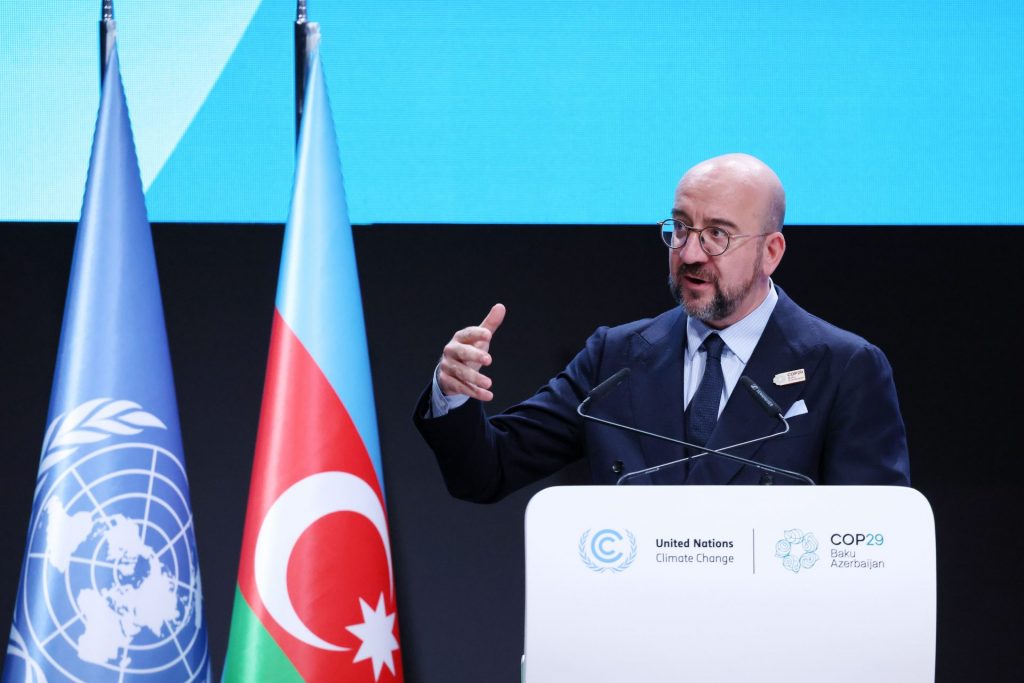 Listen to the article read by OpenAI (Beta). Please bear in mind that AI translations might require some time for processing.
Listen to the article read by OpenAI (Beta). Please bear in mind that AI translations might require some time for processing.A group of leaders from both developed nations and countries vulnerable to climate change called for enhanced climate funding on Wednesday at the United Nations Climate Change Conference (COP29) in Baku, Azerbaijan.
The UN has cautioned that by 2024, global temperatures could surpass the crucial limit of 1.5 degrees Celsius above pre-industrial levels. While this does not signify an immediate breach of the target, which is examined over several decades, it is an alarming situation.
“What you hear is the ticking clock. We are in a critical countdown to maintain global temperature rise below 1.5 degrees Celsius. Time is not on our side. If emissions do not drastically reduce and adaptation methods do not advance, all economies will endure serious consequences.”
António Guterres, Secretary-General of the United Nations
During the conference, strides were made towards forming a UN-backed global carbon market, with governments agreeing on new standards for tradeable credits aimed at fulfilling climate objectives, similar to the European Union’s Emissions Trading System (ETS). This consensus was hailed as a significant achievement following nearly ten years of complex negotiations over carbon credit trading regulations.
Nevertheless, the discussions among global leaders showcased varying viewpoints on addressing climate change, which led to tough negotiations surrounding climate funding.
The conference was further complicated by the re-election of Republican Donald Trump as the President of the United States. Trump has previously signaled intentions to withdraw the US from its commitments to lower carbon emissions and has vowed to exit the Paris Agreement when he resumes the presidency in January 2025.
Critical Emission Alerts
Preliminary findings from the Global Carbon Project indicate that carbon dioxide emissions from oil, gas, and coal have reached unprecedented heights this year, coinciding with the leaders’ meeting in Baku.
The data suggests that to accomplish the ambitious goal set by the Paris Agreement of capping warming at 1.5 degrees Celsius, global net-zero CO2 emissions should be achieved by the late 2030s, rather than the previously aimed for year of 2050.
Research attributes the increase in CO2 emissions to rises from India and the international aviation sector, while emissions have decreased in the European Union and the United States.
This year is projected to be the hottest on record, with temperatures expected to exceed 1.5 degrees Celsius, according to the EU’s Copernicus Climate Change Service. They pointed out that this significant temperature milestone should act as an urgent call to action in the UN negotiations focused on reducing greenhouse gas emissions.
Iliana Ivanova, the European Commissioner for Innovation, Research, Culture, Education, and Youth, emphasized that a six-fold acceleration in the decarbonization of economies is crucial to achieve climate goals. She noted that 35 percent of the Horizon Europe initiative’s budget, amounting to 93 billion Euros over seven years, is dedicated to climate research.
Demand for Increased Climate Funding
A coalition of developed nations currently assisting poorer countries with climate adaptation is urging other affluent countries and major polluters, including China and Gulf states, to step up their contributions as well. According to longstanding UN classifications, China and Gulf countries are regarded as developing nations and therefore receive climate aid.
As negotiations progressed, negotiators presented a new draft agreement on finance that includes various options for raising funds, though persistent issues have hampered the path to a final agreement.
Many developing nations are pushing for a pledge from richer countries of at least 1.3 trillion Dollars annually, a figure that significantly surpasses the current 100 billion Dollars provided by a select group of developed countries, including the US, EU, and Japan.














Leave a Reply